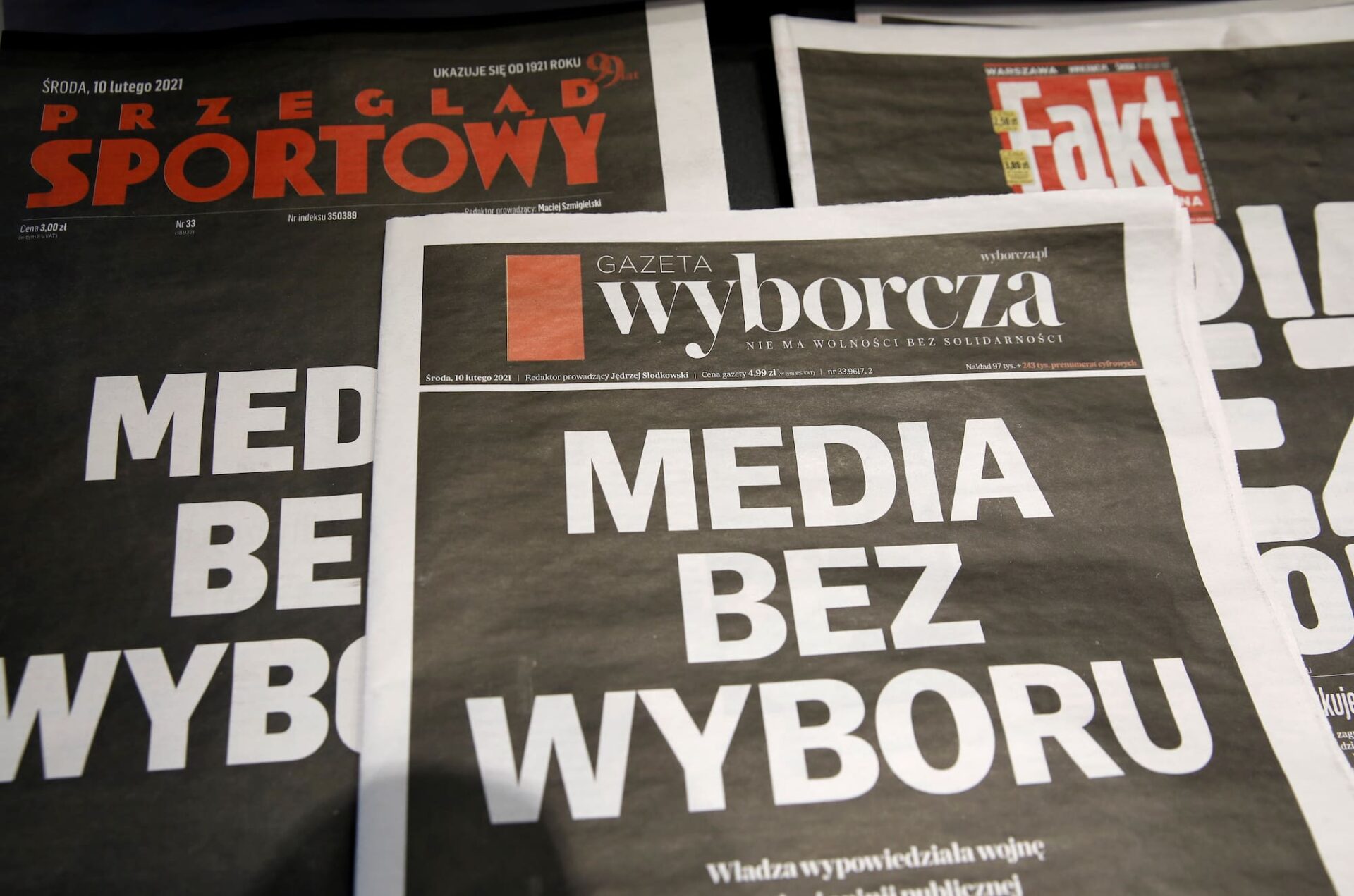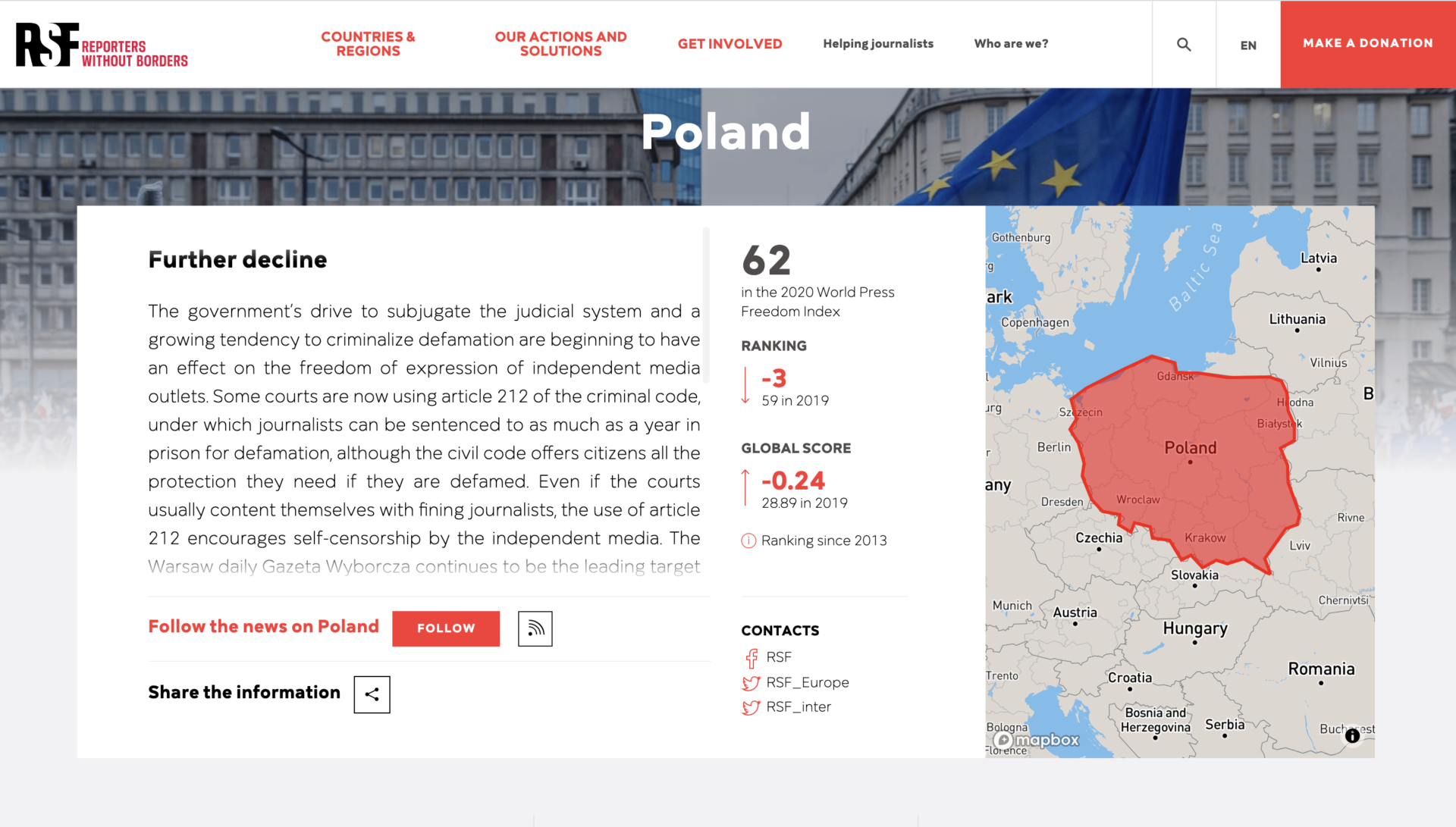No, the so-called solidarity tax that has been proposed in Poland is not about supporting the fight against the coronavirus pandemic as the government claims. Instead, it is meant to hit independent media outlets, especially those that have vocally criticized the ruling party.
Now, as the Visegrad Group is about to celebrate the 30th anniversary of its founding in February 1991, the Hungarian government has tightened its grip on the media by eliminating one of the last independent radio stations Klubrádió. While Prime Minister Viktor Orban is finalizing his years-long efforts to silence the press, the Polish government is speeding up its attack on the media, announcing a draft bill imposing a new ‘advertising fee’ on media outlets. The tax has been presented as a tool to combat the effects of COVID-19, but in practical application it will financially hit and thereby silence private media companies, especially the biggest players on the market such as the television station TVN (Discovery Network), the newspaper Gazeta Wyborcza (Agora), and the news portal onet.pl (Ringier Axel Springer).

The first pages of Poland’s main private newspapers have black front pages with the slogan ‘Media without choice’ written on them in protest against a proposed media advertising tax, Warsaw, Poland February 10, 2021. Source: KACPER PEMPEL / Reuters / Forum
In response, more than 45 media outlets signed an open letter to the authorities criticizing the government’s plans and took part in an unprecedented blackout protest on Wednesday, 10 February. ‘We strongly oppose the use of the epidemic as an excuse to introduce another new exceptionally heavy burden on the media,’ the letter reads. ‘Its introduction will mean the weakening or even closure of a part of the media operating in Poland, which will significantly limit society’s ability to choose the content it is interested in.’
It was a day without news coverage in Poland. Websites and television stations went black, and radio stations stopped broadcasting, sending a clear message to the public: this is what it will be like without independent media. The ultimate goal of the draft bill seems clear: to silence outlets critical of the government so that Poles are presented with only one vision of the world, that promoted by Law and Justice, the ruling party in Poland. As independent outlets were protesting, the pro-government media was broadcasting propaganda supporting Prime Minister Mateusz Morawiecki and attacking the signatories of the letter. According to Polish Public Television (TVP), which would be better described as a state-run broadcaster rather than a public one, the protest demonstrates that ‘foreign media companies don’t want to pay for healthcare and culture [in Poland]’.
State-funded government propaganda service TVP Info: “THE BOSSES OF MEDIA CONCERNS EARN MILLIONS, BUT DON’T WANT TO SHARE THE PROFITS WITH POLES”.
Are they suggesting these companies don’t pay corporate income tax? pic.twitter.com/oVZ9yUoRZz
— Ben Stanley (@BDStanley) February 10, 2021
Such attacks, however, are nothing new. Like in Hungary, government-friendly media outlets in Poland regularly run defamatory campaigns against individuals and entities that do not fit the governmental ecosystem. Independent journalists who expose scandals and misconduct face constant attacks from the propaganda media, which is generously supported by taxpayer money.
According to the new draft bill, 50% of the income generated from the new fee (approx. 400 million PLN) will go to the National Health Fund, and 35% to the newly established Fund for Culture and National Heritage. This fund will support ‘new media projects related to digital change and promoting national heritage’. The authors of the draft claim that part of the tax will go back to media organizations working on such projects. In reality, though, these funds will be distributed to media outlets chosen by this new government-controlled body. So, in the end, the private media will be bankrolling propaganda mouthpieces. Just recently, the government provided 2 billion PLN in funding to TVP, rejecting the opposition’s appeal to use this money to subsidize healthcare.
With these latest steps, Law and Justice is moving forwards on its path towards media ‘re-polonisation’, a political buzzword used by the party for years. In December the state-controlled oil refiner PKN Orlen took over the biggest local media group in the country, PolskaPresse, which was previously owned by the German Verlagsgruppe Passau, and gained more than 17 million readers, 20 regional newspapers, 120 local weeklies, and over 500 websites. The transaction was praised by Morawiecki as an important step in ‘re-polonizing’ the media sector. Two months earlier, Polish Minister of Culture Piotr Gliński declared that ‘Polish state companies should be buying media outlets where this is possible’, adding that he would soon take further steps towards reducing foreign ownership of the Polish media.
Reducing media sustainability and independence will certainly have a negative impact on the media’s main task – holding power to account. If the new bill passes, Poland’s media landscape will soon resemble Hungary’s. In 2020 Poland fell again in the RSF’s World Press Freedom Index to its worst-ever position – dropping to 62 from 18 in 2015, when Law and Justice took power. Since then, the independent media has been one of its main targets. In its first term, the ruling party took total control over public media. One of the party’s best-known former spin doctors, Jacek Kurski, became the head of TVP, which quickly turned into a propaganda centre and a source of domestic disinformation campaigns. Moreover, state companies have been funneling huge amounts of money into outlets supporting the ruling party and, simultaneously, withdrawing ads from media critical to the government.

Source: https://rsf.org/en/poland
According to the 2020 Freedom House Index, Poland has dropped in the rankings and is now considered to be a ‘semi-consolidated democracy’, losing full democratic status – the only EU country besides Hungary to have done so. Describing the situation in 2020, the report noted that ‘media freedoms continued to deteriorate. Having taken over the broadcasting supervisory bodies and the public broadcasters themselves, [Law and Justice] announced plans to curb the remaining independent media during its second term.’ The latest report by the International Press Institute (IPI) points out that “media freedom in Poland now faces its greatest set of challenges since 2015. During the COVID19 pandemic, the ruling Law and Justice (PiS) party continued to wage a multi-pronged attack on independent media in an effort to muzzle critical reporting and undermine watchdog journalism.”
Soon, the black screens of 10 February might not be a symbol of protest but the new reality, in which domestic disinformation and propaganda campaigns will dominate the public space in Poland.
Cover photo: The first pages of Poland’s main private newspapers have black front pages with the slogan ‘Media without choice’ written on them in protest against a proposed media advertising tax, Warsaw, Poland February 10, 2021.Source: KACPER PEMPEL / Reuters / Forum
Anna Gielewska is co-founder and editor-in-chief of VSquare and co-founder of Polish investigative outlet FRONTSTORY.PL. She is also vice-chairwoman of Fundacja Reporterów (Reporters Foundation). A journalist specializing in investigating organized disinformation and propaganda, Gielewska was the John S. Knight Fellow at Stanford University (2019/20) and has been shortlisted for the Grand Press Award (2015, 2021, 2022) and the Daphne Caruana Galizia Award (2021, 2023). She was the recipient of the Novinarska Cena in 2022.







